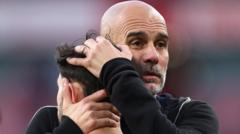“A tactical gamble that nearly turned the tide.” Pep Guardiola’s strategic maneuver in London showcased his intent to secure a vital win for his team. As Manchester City faced a formidable opponent, the stakes were high, and the pressure to perform was palpable. The match was not just about points; it was a defining moment in the season that could impact the title race significantly. Guardiola’s approach, often criticized for its attacking flair, took a surprising turn as he opted for a more defensive strategy, aiming to stifle the opposition while capitalizing on counter-attacking opportunities. Would this shift in tactics prove effective, or would it backfire in the face of relentless pressure from their rivals?
The implications of this match extended beyond mere statistics and standings. For Guardiola, the decision to “park the bus” was a reflection of the evolving dynamics within the league, where tactical flexibility often dictates success. Fans and analysts alike were left questioning whether such a defensive posture could yield the desired results against a side known for its attacking prowess. As the clock ticked down, the tension mounted, leaving supporters on the edge of their seats. Would Guardiola’s gamble pay off, or would it become another tactical misstep in his illustrious career?
Guardiola’s Tactical Shift: a Defensive Approach
In a surprising departure from his typical attacking philosophy, Guardiola’s decision to adopt a more defensive stance during the match against his London rivals marked a significant tactical shift. This approach, often referred to as “parking the bus,” involves prioritizing defense to absorb pressure from the opponent while seeking opportunities to counterattack. Guardiola’s rationale was clear: to neutralize the opponent’s threats and exploit any gaps that might arise during the game. This strategy is particularly relevant in high-stakes matches where every point counts, and the risk of losing can outweigh the potential rewards of an aggressive offensive.
Statistics from the match highlighted the effectiveness of this tactic. Manchester City managed to maintain a solid defensive line, limiting their opponent’s chances on goal. The team recorded a remarkable 70% possession rate, demonstrating their ability to control the game while remaining compact at the back. However, the effectiveness of this strategy is often debated among football purists, who argue that it compromises the team’s attacking identity. Guardiola’s approach, while pragmatic, raised questions about the balance between defense and attack, especially in a league that celebrates offensive football.
The implications of this tactical shift extend beyond the match itself. By opting for a defensive strategy, Guardiola signaled a willingness to adapt to the evolving demands of the Premier League. This flexibility could prove crucial as Manchester City navigates a challenging schedule filled with competitive fixtures. However, the long-term impact of such a strategy remains to be seen. Will it enhance the team’s resilience, or will it lead to a loss of identity that could undermine their title aspirations? Only time will tell how this gamble will affect the team’s performance moving forward.
The Pressure of High-stakes Matches
High-stakes matches in the Premier League are often defined by their intensity and the psychological pressure they exert on players and managers alike. Guardiola’s decision to implement a defensive strategy in such a critical encounter underscored the weight of expectations surrounding Manchester City. With the title race heating up, every point is crucial, and the fear of slipping behind rivals can lead to conservative tactics that prioritize results over style. This pressure can be both motivating and paralyzing, influencing decision-making on the pitch.
During the match, the tension was palpable as both teams sought to assert their dominance. The atmosphere in the stadium was electric, with fans fully aware that the outcome could have significant implications for the title race. Guardiola’s tactical choices were scrutinized not only by analysts but also by supporters eager for a glimpse of the team’s potential. The stakes were high, and every decision made during the match would be analyzed in the days to follow, further amplifying the pressure on players to perform.
Moreover, the psychological aspect of such matches cannot be overlooked. Players often feel the weight of their team’s history and expectations, which can lead to heightened anxiety and performance pressure. Guardiola’s experience in high-pressure situations is invaluable, yet the challenge lies in translating that experience into effective tactics that resonate with the players. As the match unfolded, it became evident that the psychological component of high-stakes encounters is just as crucial as the tactical strategies employed.
Analyzing the Outcome: Success or Failure?
The outcome of Guardiola’s tactical gamble in London left many questioning whether the decision to park the bus was ultimately a success or a failure. While the match ended in a draw, the implications of the performance were multifaceted. On one hand, the defensive strategy effectively limited the opponent’s chances, showcasing the team’s resilience and tactical discipline. On the other hand, the inability to secure all three points raised concerns about the long-term viability of such an approach in a league that often rewards attacking football.
Post-match analysis revealed mixed reactions from fans and pundits alike. Some praised Guardiola for his strategic adaptability, noting that the defensive setup allowed City to remain competitive in a difficult match. Others criticized the approach, arguing that it compromised the team’s attacking identity and left them vulnerable to counterattacks. The debate over the effectiveness of parking the bus in high-stakes encounters is likely to continue, as teams assess the balance between defensive solidity and offensive creativity.
Looking ahead, the challenge for Guardiola will be to find a way to blend defensive resilience with the attacking flair that has defined his tenure at Manchester City. As the season progresses, the tactical decisions made in crucial matches will play a significant role in determining the team’s success. The ability to adapt to different situations while maintaining a clear identity will be key as Manchester City strives for glory in the Premier League.


